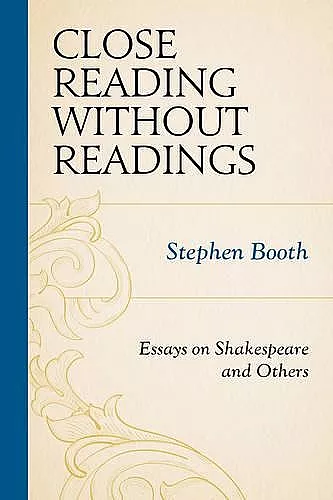Close Reading without Readings
Essays on Shakespeare and Others
Format:Hardback
Publisher:Associated University Presses
Published:14th Dec '15
Currently unavailable, and unfortunately no date known when it will be back
This hardback is available in another edition too:
- Paperback£43.99(9781611478921)

Dealing mainly with the works of William Shakespeare, the essays in Close Readings without Readings reflect Stephen Booth’s lifelong interest in uncovering the ways great literature works upon readers. As the book’s title suggests, the author does not aim to create new or novel interpretations or to uncover the political agendas of literary works, but to notice language patterns—repetitions, analogies, correspondences, echoes, overtones—and other ways in which the choice and the arrangement of words affect readers. For Booth, close reading is a practice of attentiveness. He notices how, why, and in what ways Shakespeare’s works affect his readers. Whether readers agree with the premises of a literary work or not, they subject themselves, knowingly or not, to its effects. For Booth, what we value in literature is the experience. He has devoted his own work to recognizing the nature, process, and functions of reading literature, and to teaching others to do the same. Recent years have seen Booth’s efforts recognized by volumes dedicated both to close reading and to his achievements as editor, scholar, critic, and teacher.
This collection of 13 essays by influential scholar Stephen Booth includes some heretofore unpublished conference papers and some previously published works. As a deconstructionist pioneer, Booth discusses the unsettled meanings in literary works, some 'irritants,' and insists (as Prospero does with Miranda) that readers must be attentive to primary texts. Booth offers, for example, close readings of Julius Caesar—a play that 'makes fools of its audience'—and the 'editor-made text' of Hamlet. Booth also explores Marlowe’s Hero and Leander, Milton’s Paradise Lost,and Shakespeare’s Antony and Cleopatra, Romeo and Juliet, The Winter’s Tale, Twelfth Night,and Othello. In all of the essays, Booth’s tone is humorous and vital, even visceral. As in every perfect piece of literature, form and content meet in this book as Booth uses stylistic practices similar to those he explores. For example, in 'Witty Partition of A Midsummer Night’s Dream,' Booth uses a conversational, direct address challenging the audience to experience the beauty in literature. A demanding writer, Booth admits to offering 'painful exercises' in these readings and unapologetically commands readers to 'engage in some [them]selves.' Summing Up: Recommended. Upper-division undergraduates through faculty. * Choice Reviews *
There is much to learn from this collection, especially for students new to the game. As ever, the lesson is simple: pay attention to the object of literary art—not just to its subject—and to the behavior of your mind as it pays attention. Read Booth’s book, therefore, and again and again; and, this time, may the lesson take. * Modern Philology *
ISBN: 9781611478907
Dimensions: 239mm x 157mm x 18mm
Weight: 413g
200 pages